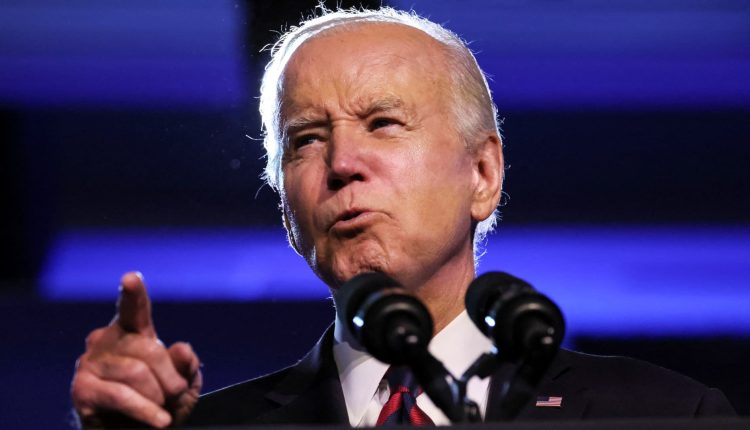U.S. President Joe Biden speaks to United Auto Workers members at the UAW’s Community Action Program legislative conference in Washington, D.C., on Jan. 24, 2024.
Leah Millis | Reuters
The Biden administration announced on Wednesday that it will try to deliver student loan forgiveness to borrowers experiencing financial hardship.
After the Supreme Court struck down President Joe Biden’s executive order to cancel up to $20,000 in student debt for tens of millions of Americans, his administration has searched for ways to cancel the debt using existing legal authority.
In what has become known as Biden’s Plan B for student loan forgiveness, the president has turned to the rulemaking process.
More from Personal Finance:
Forget a soft landing, there may be ‘no landing’
‘Positive’ labor market data can feel awful. Here’s why
Gen Z is getting money advice from TikTok
Over three rulemaking sessions, the negotiators tasked with determining who is eligible for the president’s revised relief plan came up with several groups of borrowers, including those with balances greater than what they originally borrowed and students from schools of questionable quality.
The Biden administration has been under pressure, however, to expand its aid to borrowers in financial hardship, too.
“We are concerned that, without full consideration of cancellation targeted toward borrowers facing financial hardship, the rule will not provide adequate debt relief for the most vulnerable borrowers,” lawmakers including Sen. Elizabeth Warren, D-Mass., wrote to U.S. Secretary of Education Miguel Cardona on Jan. 24.
The Biden administration seems to have heard those worries. The U.S. Department of Education will hold an additional rulemaking session on Feb. 22 and Feb. 23, during which the negotiating committee will focus exclusively on how to deliver relief to struggling borrowers.
Biden’s Plan B could forgive student debt for as many as 10 million people, according to one estimate. The president may try to deliver that relief before the presidential election in November.
In addition to the president’s second attempt to deliver sweeping student loan cancellation, the Education Department, under his tenure, has made a number of improvements to the government’s current debt forgiveness programs. As a result of those changes, more than 3.7 million Americans have received loan cancellation, totaling $136 billion in aid.
The administration is working to identify pathways to forgive student debt for as many borrowers as possible while staying within the limits articulated by the Supreme Court last year, according to a source familiar with its plans.
Student loan forgiveness and voters
As Biden prepares to run again for president, he’s trying to recover lost support among young voters and make up for the disappointment felt by borrowers who didn’t get the student loan forgiveness he promised.
During the 2020 presidential campaign, Biden pledged to forgive a large amount of student debt if he made it to the White House.
That vow likely played a role in the unprecedented turnout of college students in the election, experts say. Young voters also proved crucial to Biden’s success in several key states, including Arizona, Michigan and Pennsylvania.
Over 40 million people were promised cancellation, a number that dwarfs the 3.7 million who have received some measure of relief.
Astra Taylor
co-founder of the Debt Collective
Ultimately, the Supreme Court blocked the president from fulfilling his campaign promise last summer, ruling that his $400 billion loan cancellation plan exceeded the power of the executive branch. That decision came after the Biden administration opened applications for its loan relief of up to $20,000 per borrower and announced to some that it had “fully approved” their relief.
At the very least, that has likely left many young voters feeling frustrated with the political process, said Adam Gismondi, director of the National Study of Learning, Voting and Engagement at Tufts University, the largest survey of college student voting in the U.S.
“It seemed to be straightforward and achievable, but the political realities often end up complicating proposed policy solutions,” Gismondi said in a recent interview with CNBC.
Voters who support cancellation of the debt likely won’t find a more appealing stance in Biden’s opponent. Republicans largely oppose debt jubilees.
Former President Donald Trump said at a campaign event last summer that Biden’s effort to relieve people of their debts “would have been very unfair to the millions and millions of people who paid their debt through hard work and diligence.” While in office, Trump also looked to kill the popular Public Service Loan Forgiveness program, which clears the debt of government and certain nonprofit workers after a decade.
Still, Astra Taylor, co-founder of the Debt Collective, a union for debtors, believes Biden has to do more.
“Over 40 million people were promised cancellation, a number that dwarfs the 3.7 million who have received some measure of relief,” Taylor said.
Don’t miss these stories from CNBC PRO:
Read the full article here

